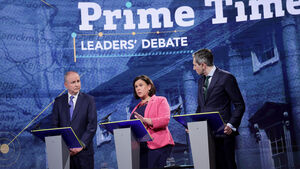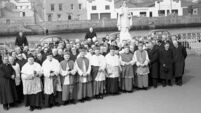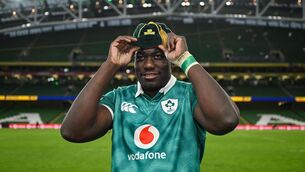Election campaign just never caught fire

Fianna Fáil leader Micheál Martin, Sinn Féin leader Mary Lou McDonald and Fine Gael leader Simon Harris are pictured during the leaders' debate on RTÉ television in the final week of the General Election. Picture: Maxwell's
In the pause after the election campaign concluded and the last seat was filled, politicians and public drew a collective breath. Assessments included 'Not very memorable' and 'Much ado about very little'. Indeed very little seemed to catch fire except maybe the parable of the late evening incident in Kanturk.
My own verdict was that there was something strange about the whole campaign, almost a sense that it wasn’t connecting with reality, that it was more like a play with the actors hamming it up for their own supporters.
The RTÉ leaders' debate was a case in point. There was a strange atmosphere to it. The three leaders squeezed together, almost sitting in each others’ pockets and in contrast the two interviewers presiding on an outsized podium. Something wasn’t quite right.
Even the oft-repeated RTÉ mantra that ‘one of the three will be Taoiseach’ didn’t make sense. Technically, yes. But effectively, no.
While Micheál’s and Simon’s credentials for the top job were obvious, there was something of a question mark around Mary Lou’s participation. Of course it was ‘the leaders’ debate’ and it couldn’t have happened without her but her participation was, to a large degree, symbolic.
It’s not that I question her right to be judged as a leader on a par with her two male colleagues. After all, the polls at this point had clearly indicated that there was hardly a hare’s-breath between the three of them. No one could say that the two men and the one woman were not the three people in Ireland who had the right to be recognised and respected as the three main political leaders in Ireland today.
It was, however, a different question as to whether all of the three would or could be the next Taoiseach. Clearly, either Martin (probably) and Harris (later on) are expected to be the next Taoiseach but that couldn’t be said of MacDonald.
In Ireland, the purpose of general elections is to ensure that a government is available to run the country for the next five years. And the party (or parties) that get to run the country are those who can provide the requisite number of elected TDs plus a few more who can ensure that whatever decisions the government makes can be reliably voted through.
Martin and Harris have made it clear that they are prepared to join in a coalition with another party or parties that share their policies and clearly one or other will be the Taoiseach.
But the question that hung over the leaders' debate was that while Sinn Féin (SF) was willing to lead a government what they were bringing to the table wasn’t enough to provide a government. It was the equivalent of someone proposing to make a cup of tea while everyone knows that they have no way of boiling the water.
Of course, Sinn Féin was prepared to lead a government but the total number of election candidates fielded was not sufficient – even if they were all elected – to form a government on their own.
Clearly SF would need to coalesce with other parties but despite the efforts of Richard Boyd-Barrett to establish a coalition of the Left (to be led by SF) his pleas generated a minimal response. Even though he was prepared to offer himself as an honest broker in organising a Left or Centre-Left alternative to a Fianna Fáil/Fine Gael (FF/SF) coalition, no one wanted to know.
It wasn’t unexpected because the other parties – Left or Centre-Left or single issue – would present such a loose alliance and such a varied palate that it would hardly rate as a workable government.
I don’t blame Sinn Féin for trying to present themselves as on the cusp of an historic victory. The gods haven’t looked favourably on their recent history: in one election they watched in frustration as too few candidates didn’t take electoral advantage of an unexpected rise in support; in another, it could be argued they had too many candidates; their huge lead in the polls – from a high of 36% to a low of 18% in November – had evaporated months before the 2024 election; and in the run-up to the latest election a surge in their electoral prospects ran out of space and time.
On top of that, they were deflected by a series of incidental mishaps – the Brian Stanley controversy, the abuse allegations against Sinn Féin personnel – that fed into a conviction that another electoral opportunity was missed.
Understandably, Sinn Féin were all over the shop and that had the overall effect of leaving the RTÉ stage to Martin and Harris with no other credible government being offered and McDonald almost as a nominal representative of an unworkable alternative government in the debate.
It simply fed into the inevitability of another FF/FG government, which is set to extend Fine Gael's participation in government to a possible unbroken 19 years and to confirm unapologetically a Fianna Fáil resurrection from the dead – from the political crucifixion of a recent election where they achieved 20 seats. For Sinn Féin, however, a 20% showing, though down 5% on the last election, was a reasonable achievement in the circumstances.
What is quite extraordinary is the apparent belief that somehow Sinn Féin on 20% (as it turned out) has a right to be involved in government, a belief that Miriam O’Callaghan of RTÉ (by way of quite inappropriate questions in the leaders’ debate) seemed anxious to indulge. There are, as almost everyone knows, multiple examples to the contrary, as when Fianna Fáil, for example in the Haughey era, got 44% and there was no suggestion that it entitled them to a special dispensation from the rules.
The ballot box is a hard teacher. There’s no entitlement in politics. The hindsight prospect of an imagined coalition of the Left which is widely accepted as unattainable, impractical, unworkable and absurd in its ambition is an embarrassing venture for Sinn Féin. Revamping, re-styling and detoxifying might render the party a greater service.
• To mark my Local Ireland Media Award as Columnist of the Year 2024, I’ve published a compilation of 156 columns from the in 2020, 2021 and 2022. It’s called and a limited number of copies are available at the usual outlets.




